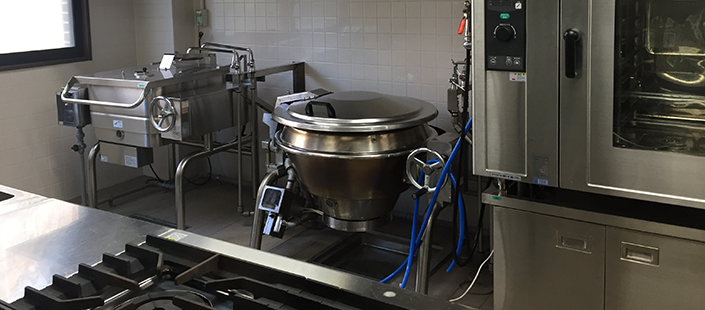- Top
- Nutrition and Food Science
ページの本文です。

Nutrition and Food Science
Science that Examines Food and People
The relationship between food and humans as well as health is a major concern of society regardless of the era.
The food we must consume as a part of our daily life is defined by various aspects, including taste, nutrition, healthiness, manufacturing, and safety.
Food is indispensable for humans to live, gives our life joy, and maintains our health, so correct knowledge regarding food is necessary.
The Department of Nutrition and Food Science studies fields related to food from a comprehensive perspective.
The department conducts scientific research on food in a wide range of disciplines, from the genetic level to human nutrition. Areas of study include food chemistry, food storage science, cooking science, nutritional chemistry, clinical nutrition, applied nutrition science, nutrition education, food service management, public health nutrition, and various other academic disciplines.
Objective: Fostering Leaders as Experts in Food
The department aims to foster experts in food nutrition science, with both a scientific perspective as well as practical skills. In addition to research focusing on the taste and quality of food, the department also conducts a full range of educational research from a nutrition science perspective on the ways in which food functions within the human body.
A scientific perspective is also necessary to consider the relationship between humans and food. The department incorporates education on basic medicine and pathology, as well as healthcare systems, social services, and other topics, to cultivate the skills necessary to evaluate food safety as a part of total management.
After graduating from the department, students may advance to graduate school. Graduates apply their specialties to jobs in a wide variety of fields, in the Ministry of Health, Labour and Welfare or other municipal civil services, food companies and other private corporations, hospitals, schools, etc.
Features: A Full Range of Experiments and Practical Training in a Wide Range of Specialties
The curriculum places a particular emphasis on experiments and practical training. First-year students acquire the knowledge, skills, and general education necessary to learn a specialty, while second-year students master logical thinking through specialty courses in food nutrition science as well as basic experiments and practical training.
In the latter half of the third year, students join a laboratory in the department and conduct graduation research on a specific theme of their own choosing. The on-site practical training required for taking the national registered dietitian exam is also offered.
The teachers in the Department of Nutrition and Food Science have expertise in a wide area of food and nutrition. Furthermore, doctors from the Health Care Center also participate in classes, offering a comprehensive education regarding health and life.
Food Factors and Functions
Students learn about the functionality (tertiary function) of food component defined as “good for human health,” which has been a topic of recent discussion, from multiple perspectives including the legal systems, qualifications, chemistry, and biological chemistry.
Nutrition Education
People eat food even when they know it is not good for them. Behavioral science is a discipline that seeks to understand this kind of complicated eating behavior. Nutrition Education teaches behavioral science as well as nutritional education methodologies.
Cookery Science
Students learn the basics of cooking delicious food both with and without heating. An understanding of the theories behind interface phenomena, heat transfer phenomena, and other phenomena helps students determine optimal cooking conditions.
Food Microbiology
The relationship between humans and microorganisms is old and deep. While learning about the history and basic knowledge of microbiology, students also study the relationship between food and microorganisms from the perspectives of food manufacturing (e.g., fermentation) and safety.
Nutrient metabolism
How is food converted to energy inside the body? Students learn about the body’s mechanisms for storing and using food energy, as well as the functions of nutrients.
Clinical Nutrition
Students learn how nutrition is involved in a variety of diseases based on findings in clinical and nutrition science, while also deepening their understanding of nutritional diet therapy based on scientific evidence.







